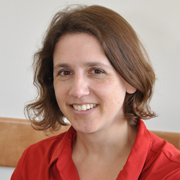Tamar Geiger

Affiliations
Department of Human Molecular Genetics and Biochemistry, Sackler Faculty of Medicine, Tel Aviv University
Biography
Tamar Geiger studied biology at the Hebrew University of Jerusalem, Israel, where she also completed her master’s and doctoral degrees in biochemistry. She carried out her Ph.D. research under the supervision of Prof. Alexander Levitzki. In 2008 she moved to the laboratory of Prof. Matthias Mann at the Max Planck Institute of Biochemistry to specialize in proteomics technology and to apply it to cancer research. During her post-doc Tamar developed the super-SILAC technique, which enables accurate quantification of proteins in human tumor samples. In October 2011 Tamar moved back to Israel and opened her own research laboratory at the Sackler Faculty of Medicine at the Tel Aviv University. She is proceeding with clinical proteomic research of breast cancer and melanoma with emphasis on the metabolic changes that occur during cancer progression and development of proteomic techniques for cancer research and biomarker discovery.
Abstract
System-wide clinical proteomics reveals metabolic remodeling upon breast cancer progression
Yair Pozniak, Nora Lahat, Camila Avivi, Iris Barshack and Tamar Geiger
The genomic and transcriptomic landscapes of breast cancer have been extensively studied, but the proteomes of breast tumors are far less characterized. Here, we use high-resolution, high-accuracy mass spectrometry to perform deep analysis of breast cancer progression using clinical breast samples from lymph node negative and lymph node positive primary tumors, as well as matched lymph node metastases and matched healthy breast epithelia.
We used the super-SILAC technique to quantify over 10,000 proteins with high accuracy, enabling us to identify key proteins and pathways that regulate tumorigenesis and metastatic spread. We identified a clear metabolic shift, which occurs upon transformation, with increased oxidative phosphorylation, and reduced glycolysis in the cancer cells compared to the healthy ducts. These changes co-occur with elevation of ribosomes and an overall decrease in cell adhesion. In addition, we extracted a 15-protein signature that predicts lymph node involvement based solely on the primary tumor, which may hold important clinical significance in disease management and treatment.

